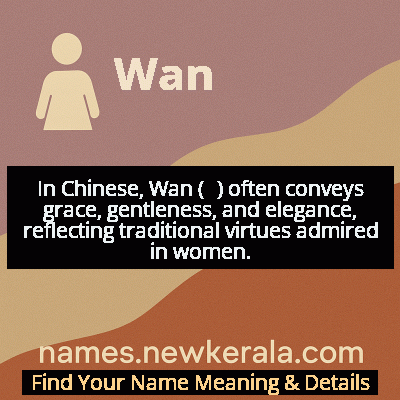Wan Name Meaning & Details
Origin, Popularity, Numerology Analysis & Name Meaning of Wan
Discover the origin, meaning, and cultural significance of the name WAN. Delve into its historical roots and explore the lasting impact it has had on communities and traditions.
Name
Wan
Gender
Female
Origin
Chinese
Lucky Number
2
Meaning of the Name - Wan
In Chinese, Wan (婉) often conveys grace, gentleness, and elegance, reflecting traditional virtues admired in women.
Wan - Complete Numerology Analysis
Your Numerology Number
Based on Pythagorean Numerology System
Ruling Planet
Moon
Positive Nature
Diplomatic, friendly, artistic, empathetic.
Negative Traits
Over-sensitive, moody, indecisive, prone to self-pity.
Lucky Colours
Green, cream, white.
Lucky Days
Monday.
Lucky Stones
Pearl, moonstone.
Harmony Numbers
1, 3, 4.
Best Suited Professions
Diplomats, mediators, caregivers, artists.
What People Like About You
Cooperative spirit, friendliness, artistic talent.
Famous People Named Wan
Wan Qing
Actress
Award-winning performances in both historical and contemporary Chinese cinema
Wan Fang
Playwright/Author
Significant contributions to modern Chinese literature and theater
Wan Rong
Empress
Last Empress of China whose life story represents the end of imperial China
Wan Hu
Legendary Figure
Folk hero representing early Chinese aspirations for technological advancement
Name Variations & International Equivalents
Click on blue names to explore their detailed meanings. Gray names with will be available soon.
Cultural & Historical Significance
Extended Personality Analysis
People named Wan typically exhibit a personality profile characterized by emotional intelligence, cultural sensitivity, and diplomatic grace. They possess an innate ability to understand and respond to the emotional needs of others, making them exceptional friends, partners, and colleagues. Their gentle exterior often conceals a resilient core - they approach challenges with quiet determination rather than aggressive confrontation. Wan individuals tend to be highly observant and intuitive, able to read social dynamics and adjust their behavior accordingly. They often excel in fields requiring subtle communication and relationship management, such as education, counseling, arts, and diplomacy. Their approach to life combines traditional wisdom with modern adaptability, allowing them to navigate changing circumstances while maintaining their core values. The name's association with beauty extends beyond physical appearance to encompass their actions, words, and the harmonious environments they create around themselves. They typically value deep, meaningful relationships over superficial connections and invest considerable energy in maintaining family and community bonds.
Modern Usage & Popularity
In contemporary naming practices, Wan continues to be chosen by parents who value its elegant simplicity and deep cultural roots. While it may not rank among the most popular names in modern China's urban centers, it maintains steady usage among families with strong connections to traditional culture. The name has found particular resonance in overseas Chinese communities, where it serves as a cultural identifier and connection to heritage. Interestingly, Wan has also gained some international appeal beyond Chinese communities, appreciated for its soft, melodic sound and positive meanings. Social media platforms and global cultural exchange have introduced the name to wider audiences, with some non-Chinese parents selecting it for its beautiful connotations. Current naming trends show that Wan is often combined with modern middle names or used in compound names that blend traditional and contemporary elements. Its usage reflects the ongoing negotiation between cultural preservation and global integration that characterizes modern Chinese identity worldwide.
Symbolic & Spiritual Meanings
Symbolically, the name Wan represents the philosophical concept of 'softness overcoming hardness' that is central to Taoist and Confucian thought. It embodies the idea that gentle persistence and graceful adaptation are more effective than brute force in achieving lasting results. The name connects to natural symbols of resilience and beauty - like the willow tree that bends in the storm but doesn't break, or water that wears away stone through constant gentle flow. In Chinese cultural symbolism, Wan represents the ideal balance between yin and yang energies, demonstrating that receptivity and gentleness are forms of strength. The name also carries metaphorical associations with classical Chinese arts - the subtle brushstrokes of calligraphy, the restrained elegance of porcelain, and the nuanced emotions expressed in traditional poetry. It symbolizes cultural continuity and the transmission of refined values across generations. In a modern context, Wan represents the enduring relevance of traditional virtues in contemporary life, suggesting that grace, cultural literacy, and emotional intelligence remain valuable assets in our rapidly changing world.

